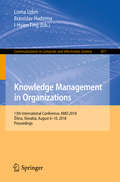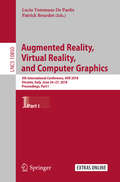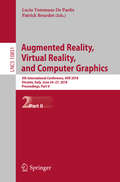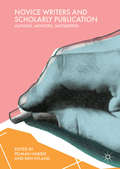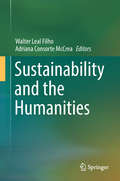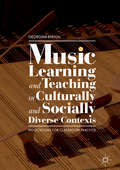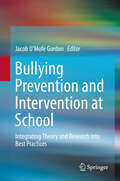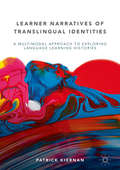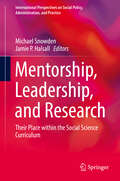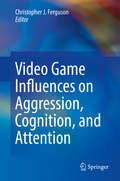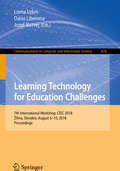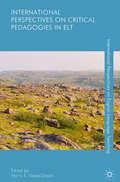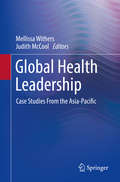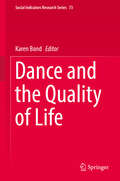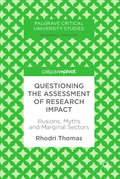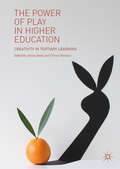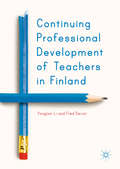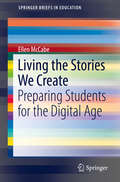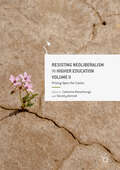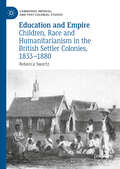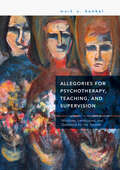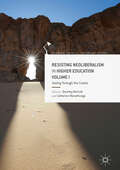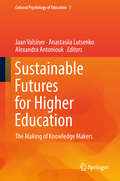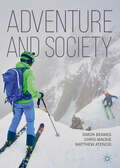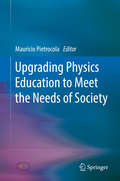- Table View
- List View
Knowledge Management in Organizations: 13th International Conference, KMO 2018, Žilina, Slovakia, August 6–10, 2018, Proceedings (Communications in Computer and Information Science #877)
by Lorna Uden I-Hsien Ting Branislav HadzimaThis book contains the refereed proceedings of the 13th International Conference on Knowledge Management in Organizations, KMO 2018, held in Žilina, Slovakia, in August 2018. The theme of the conference was "Emerging Research for Knowledge Management in Organizations."The 59 papers accepted for KMO 2018 were selected from 141 submissions and are organized in topical sections on: Knowledge management models and analysis; knowledge sharing; knowledge transfer and learning; knowledge and service innovation; knowledge creation; knowledge and organization; information systems and information science; knowledge and technology management; data mining and intelligent science; business and customer relationship management; big data and IoT; and new trends in IT.
Augmented Reality, Virtual Reality, and Computer Graphics: 5th International Conference, AVR 2018, Otranto, Italy, June 24–27, 2018, Proceedings, Part I (Lecture Notes in Computer Science #10850)
by Lucio Tommaso De Paolis Patrick BourdotThe 2-volume set LNCS 10850 and 10851 constitutes the refereed proceedings of the 5th International Conference on Augmented Reality, Virtual Reality, and Computer Graphics, AVR 2018, held in Otranto, Italy, in June 2018. The 67 full papers and 26 short papers presented were carefully reviewed and selected from numerous submissions. The papers are organized in the following topical sections: virtual reality; augmented and mixed reality; computer graphics; human-computer interaction; applications of VR/AR in medicine; and applications of VR/AR in cultural heritage; and applications of VR/AR in industry.
Augmented Reality, Virtual Reality, and Computer Graphics: 5th International Conference, AVR 2018, Otranto, Italy, June 24–27, 2018, Proceedings, Part II (Lecture Notes in Computer Science #10851)
by Lucio Tommaso De Paolis Patrick BourdotThe 2-volume set LNCS 10850 and 10851 constitutes the refereed proceedings of the 5th International Conference on Augmented Reality, Virtual Reality, and Computer Graphics, AVR 2018, held in Otranto, Italy, in June 2018. The 67 full papers and 26 short papers presented were carefully reviewed and selected from numerous submissions. The papers are organized in the following topical sections: virtual reality; augmented and mixed reality; computer graphics; human-computer interaction; applications of VR/AR in medicine; and applications of VR/AR in cultural heritage; and applications of VR/AR in industry.
Novice Writers and Scholarly Publication: Authors, Mentors, Gatekeepers
by Ken Hyland Pejman HabibieThis book draws on the perspectives of authors, supervisors, reviewers and editors to present a rich, nuanced picture of the practices and challenges involved in writing for scholarly publication. Organized into four sections, it brings together international experts and junior scholars from a variety of disciplines to examine both publishing experiences and current research in the field. In doing so, it challenges the view that Native English speakers have a relatively easy ride in this process and that it is only English as an Additional Language (EAL) scholars who experience difficulties. The volume highlights central themes of writing for publication, including mentoring and collaborative writing, the writing experience, text mediation, the review process, journal practices and editorial decision-making, and makes a strong case for taking a more inclusive approach to research in this domain. This edited collection will appeal to students and scholars of applied linguistics, English for academic purposes, academic writing, and second language writing.
Sustainability and the Humanities
by Walter Leal Filho Adriana Consorte McCreaThis book explores the strong links between sustainability and the humanities, which go beyond the inclusion of social sciences in discussions on sustainability, and offers a holistic discussion on the intellectual and moral aspects of sustainable development. The contributions from researchers in the fields of education, social sciences, religion, humanities, and sustainable development fulfill three main aims:They provide university lecturers interested in humanities and sustainable development with an opportunity to present their work;foster the exchange of information, ideas and experiences acquired in the execution of teaching and research; anddiscuss methodological approaches and projects that provide a better understanding of how the humanities can contribute to the debate on sustainable development. Prepared by the Inter-University Sustainable Development Research Programme and the World Sustainable Development Research and Transfer Centre, the book reiterates the need to promote integrated approaches to sustainable development. Including practice-based lessons learnt that can be replicated further, it is a valuable resource for scientists and practitioners working in the humanities and sustainable development.
Music Learning and Teaching in Culturally and Socially Diverse Contexts: Implications for Classroom Practice
by Georgina BartonThis book examines the inter-relationship between music learning and teaching, and culture and society: a relationship that is crucial to comprehend in today’s classrooms. The author presents case studies from diverse music learning and teaching contexts – including South India and Australia and online learning environments – to compare the modes of transmission teachers use to share their music knowledge and skills. It is imperative to understand the ways in which culture and society can in fact influence music teachers’ beliefs and experiences: and in understanding, there is potential to improve intercultural approaches to music education more generally. In increasingly diverse schools, the author highlights the need for culturally appropriate approaches to music planning, assessment and curricula. Thus, music teachers and learners will be able to understand the diversity of music education, and be encouraged to embrace a variety of methods and approaches in their own teaching. This inspiring book will be of interest and value to all those involved in teaching and learning music in various contexts.
Bullying Prevention and Intervention at School: Integrating Theory and Research into Best Practices
by Jacob U'Mofe GordonThis book examines the continuum of bullying services, including prevention, intervention, and recovery. It reviews current theories, studies, and programs relating to this issue as well as outcome-based solutions to enhance best practices. Chapters discuss prevention and intervention services such as enhancing and promoting teacher skills in identifying abusive behaviors; interventions with bullies, victims, bystanders, and enablers; and curbing digital forms of bullying. International perspectives on program development and delivery offer fresh approaches to conceptualizing a school’s particular bullying problems and creating effective policy. In addition, chapters cover program evaluation, guiding principles for evaluators, measurement methods, and documenting and disseminating findings. The book also provides recommendations for program development. Topics featured in this book include:An Adlerian approach to predicting bullying behavior.Bibliotherapy as a strategy for bullying prevention.Coaching teachers in bullying detection and intervention.Cyberbullying prevention and intervention.The “Coping with Bullying” program in Greek secondary schools.Factors that affect reporting victimization in South African schools. Bullying Prevention and Intervention at School is a must-have resource for researchers, clinicians and other practitioners, graduate students, and policymakers across such disciplines as child and school psychology, social work/counseling, pediatrics/school nursing, and educational policy and politics.
Learner Narratives of Translingual Identities: A Multimodal Approach to Exploring Language Learning Histories
by Patrick KiernanThis book addresses translingual identities through an innovative multimodal analysis of the language learning histories of a class of advanced learners of English in Japan who grew up between two or more languages. The author explores both the translingual experiences of those in the classroom and how they use language and gesture when describing their experiences to each other. This approach uses three perspectives: it looks at the worlds and identities the interviewees construct for themselves; at their interpersonal communication; and at the way they frame their experience. Finally, it offers some lessons based on the observations of the class which reveal the values they share and the key to their success as language learners. It will appeal to applied linguistic and educational researchers, particularly those with an interest in narrative approaches to exploring educational contexts, as well as language educators and policy makers interested in gaining a learner perspective on language learning.
Mentorship, Leadership, and Research: Their Place Within The Social Science Curriculum (International Perspectives on Social Policy, Administration, and Practice)
by Jamie P. Halsall Michael SnowdenThis insightful volume details the implementation and challenges of the Teaching Excellence Framework (TEF), developed in the UK to ensure equal access to higher education for all social classes. It posits that a modern higher education institution requires a robust set of mechanisms - specifically mentorship, leadership, and research - to create high-quality teaching and learning. Noted contributors pose and answer key questions about the TEF in such areas as solution-focused teaching, mentoring for the job market, and social science curriculum development, using best practice examples in the field. These ideas and strategies carry great potential to improve the caliber of teaching and learning in universities, and with it, students’ social mobility.Among the topics covered: · Why have mentoring in universities? Reflections and justifications. · Working with students as partners: developing peer mentoring to enhance the undergraduate student experience. · The employers’ reach: mentoring undergraduate students to enhance employability. · Learn it and pass it on: strategies for educational succession. · Mentoring mentees to mentor. · Interdisciplinarity in higher education: the challenges of adaptability. Mentorship, Leadership, and Research will play a pivotal role in UK higher education since currently there is scant academic literature on practical tools to help universities to succeed at the TEF. A resource with international implications, it should interest sociologists of education and professionals in business strategy and leadership, social work, and community development. Michael Snowden is a Senior Lecturer in Mentoring Studies at the University of Huddersfield, UK. Jamie P. Halsall is a Reader in Social Sciences at the University of Huddersfield, UK. "Given the recent introduction of the Teaching Excellence Framework (TEF) in the United Kingdom, this timely book outlines effective practices to help earn the “Gold” standard. While considering TEF within the current climate of academic competition and critical evaluation, a diverse group of experts lay out why mentoring is one highly effective answer to the TEF standards and without compromising productivity in other service and research agendas. This book is a must read for academics and higher learning administrators alike."Leda Nath, Professor of Sociology, University of Wisconsin
Video Game Influences on Aggression, Cognition, and Attention
by Christopher J. FergusonThis book addresses the ongoing scientific debates regarding video games and their effects on players. The book features opposing perspectives and offers point and counterpoint exchanges in which researchers on both sides of a specific topic make their best case for their findings and analysis. Chapters cover both positive and negative effects of video games on players’ behavior and cognition, from contributing to violence and alienation to promoting therapeutic outcomes for types of cognitive dysfunction. The contrasting viewpoints model presents respectful scientific debate, encourages open dialogue, and allows readers to come to informed conclusions. Key questions addressed include: · Do violent video games promote violence? · Does video game addiction exist? · Should parents limit children’s use of interactive media? · Do action video games promote visual attention? · Does sexist content in video games promote misogyny in real life? · Can video games slow the progress of dementia? · Are video games socially isolating?Video Game Influences on Aggression, Cognition, and Attention is a must-have resource for researchers, clinicians and professionals as well as graduate students in developmental psychology, social work, educational policy and politics, criminology/criminal justice, child and school psychology, sociology, media law, and other related disciplines.
Learning Technology for Education Challenges: 7th International Workshop, LTEC 2018, Žilina, Slovakia, August 6–10, 2018, Proceedings (Communications in Computer and Information Science #870)
by Lorna Uden Dario Liberona Jozef RistvejThis book constitutes the refereed proceedings of the 7th International Workshop on Learning Technology for Education Challenges, LTEC 2018, held in Žilina, Slovakia, in August 2018. The 25 revised full papers presented were carefully reviewed and selected from 54 submissions. The papers are organized in the following topical sections: Gamification and learning; learning and knowledge transfer; learning technologies applications; virtual learning environments; and mobile learning and MOOCs. LTEC 2018 examines how these technologies and pedagogical advances can be used to change the way teachers teach and students learn, while giving special emphasis to the pedagogically effective ways we can harness these new technologies in education.
International Perspectives on Critical Pedagogies in ELT (International Perspectives on English Language Teaching)
by Mario E. López-GoparThis edited collection brings to the forefront attempts to connect critical pedagogy and ELT (English Language Teaching) in different parts of the world. The authors in this collection write from their own experiences, giving the chapters nuanced understanding of the everyday struggles that teachers, teacher educators and researchers face within different contexts. Throughout the book, contributors connect micro-contexts (classrooms) with macro-contexts (world migration, politics and social issues) to demonstrate the impact and influences of pedagogy. In problematizing ELT and focusing on so-called ‘peripheral’ countries where educators have created their own critical pedagogies to respond to their own local realities, the contributors construct ELT in a way that goes beyond the typical ESL/EFL distinction. This unique edited collection will appeal to teacher educators, in-service teachers working in the field as well as students and scholars of English language teaching, second language acquisition and language education policy.
Global Health Leadership: Case Studies From the Asia-Pacific
by Mellissa Withers Judith McCoolThis timely book serves as an overview of the challenges in global health leadership from multiple perspectives, bringing together an interdisciplinary group of academics, researchers, and leaders from around the world who are conducting innovative and high-quality research in the field of global health (GH). The book helps illustrate theoretical and conceptual ideas of leadership using recent examples of GH challenges from the Asia-Pacific region.Leadership is an important element of education and training in GH. Leadership can be demonstrated by many sectors, including local and national government, intergovernmental and non-governmental organizations, multilateral organizations, civil society, and private individuals and corporations. The cases included in this book provide an analysis of the major components to successful efforts in GH, including cooperation, cultural competency, vision, and community ownership.Given that GH practice is typically conducted in team settings with members from various backgrounds, this book provides students, faculty, and professionals in public health and related fields with an opportunity to examine multiple examples of leadership in different contexts. Readers learn how leaders have overcome challenges faced in the operationalization of complex health interventions, foreign policy, and working with key stakeholders and organizations.This book aims to help students to:Identify key trends and issues working in GH contexts;Analyze situations in GH and explain the ways public health, health care, and other organizations can work together or individually to affect the health of a community;Recognize the ways that diversity influences policies, programs, services, and the health of a community;Support diverse perspectives in developing, implementing, and evaluating policies, programs, and services that affect the health of a community;Identify characteristics of GH leaders;Learn about ways to identify and measure success in leadership; andUnderstand the challenges and barriers faced in GH programs and how to overcome those.
Dance and the Quality of Life (Social Indicators Research Series #73)
by Karen BondThis is the first volume devoted to the topic of dance and quality of life. Thirty-one chapters illuminate dance in relation to singular and overlapping themes of nature, philosophy, spirituality, religion, life span, learning, love, family, teaching, creativity, ability, socio-cultural identity, politics and change, sex and gender, wellbeing, and more. With contributions from a multi-generational group of artists, community workers, educators, philosophers, researchers, students and health professionals, this volume presents a thoughtful, expansive-yet-focused, and nuanced discussion of dance’s contribution to human life. The volume will interest dance specialists, quality of life researchers, and anyone interested in exploring dance’s contribution to quality of living and being.
Questioning the Assessment of Research Impact: Illusions, Myths And Marginal Sectors (Palgrave Critical University Studies)
by Rhodri ThomasThis book provides the first comprehensive assessment of non-academic research impact in relation to a marginal field of study, namely tourism studies. Informed by interviews with key informants, ethnographic reflections on the author’s extensive work with trade and professional associations, and various secondary data, it paints a picture of inevitable research policy failure. This conclusion is justified by reference to ill-founded official conceptualisations of practitioner and organisational behaviour, and the orientation and quality of tourism research. The author calls for a more serious consideration of research-informed teaching as a means of creating knowledge flows from universities. Research with greater social and economic impact might then be achievable. This radical assessment will be of interest and value to policy makers, university research managers and tourism scholars.
The Power of Play in Higher Education: Creativity in Tertiary Learning
by Alison James Chrissi NerantziThis book examines the increasing popularity of creativity and play in tertiary learning, and how it can be harnessed to enhance the student experience at university. While play is often misunderstood as something ‘trivial’ and associated with early years education, the editors and contributors argue that play contributes to social and human development and relations at a fundamental level. This volume invalidates the commonly held assumption that play is only for children, drawing together numerous case studies from higher education that demonstrate how researchers, students and managers can benefit from play as a means of liberating thought, overturning obstacles and discovering fresh approaches to persistent challenges. This diverse and wide-ranging edited collection unites play theory and practice to address the gulf in research on this fascinating topic. It will be of interest and value to educators, students and scholars of play and creativity, as well as practitioners and academic leaders looking to incorporate play into the curriculum.
Continuing Professional Development of Teachers in Finland
by Fred Dervin Yongjian LiThis book examines continuing professional development (CPD) of teachers in Finland. As one of the best-performing countries in terms of education, the Finnish education system is often revered and held up as an example to follow. However, the authors argue that CPD actually constitutes the Achilles’ heel of this ‘miraculous’ system, demonstrating that in fact it is a victim of contradictory discourses and actions among decision-makers, teacher educators and practitioners. Including extensive interviews from CPD providers, teachers and other educational actors, the authors critically discuss the ‘wonders’ of Finnish education, in the process debunking various myths created both inside and outside Finland. The authors also call for a new approach to comparative and international education. Based on over 20 years of experience in Finnish education, this pioneering book will be of interest and value to students and scholars of Finnish education, continuing professional development and international education branding more generally.
Living the Stories We Create: Preparing Students for the Digital Age (SpringerBriefs in Education)
by Ellen McCabeThis work explores the potential of digital media to rectify the disparity between formal learning contexts and contemporary perceptions and expectations of narrative. How can education systems respond to the changing technological landscape, thus preparing students to become active participants in society as well as to realise the extent of their own potential? This book explores such concepts in the classroom environment through direct engagement with students and teachers with the case of Shakespeare's Macbeth. Written in approximately 1606, Macbeth has its roots in a culture of orality and yet has sustained through centuries of print dominance. Indeed, as both text and performance the work itself embodies both the literary and the oral. Yet as a staple of many second level curricula increasingly Macbeth is perceived as an educational text. Macbeth reflects its cultural moment, an age of ambiguity where much like today notions of selfhood, privacy, societal structures, media and economy were being called into question. Thus Macbeth can be understood as a microcosm of the challenges existing in contemporary education in both content and form. This book examines Macbeth as a case-study in seeking to explore the implications of digital media for learning, as well as its possible potential to constructively facilitate in realigning formal learning contexts to contemporary experiences of narrative.
Resisting Neoliberalism in Higher Education Volume II: Prising Open The Cracks (Palgrave Critical University Studies)
by Dorothy Bottrell Catherine ManathungaThis book outlines the creative responses academics are using to subvert powerful market forces that restrict university work to a neoliberal, economic focus. The second volume in a diptych of critical academic work on the changing landscape of neoliberal universities, the editors and contributors examine how academics ‘prise open the cracks’ in neoliberal logic to find space for resistance, collegiality, democracy and hope. Adopting a distinctly postcolonial positioning, the volume interrogates the link between neoliberalism and the ongoing privileging of Euro-American theorising in universities. The contributors move from accounts of unmitigated managerialism and toxic workplaces, to the need to decolonise the academy to, finally, illustrating the various creative and counter-hegemonic practices academics use to resist, subvert and reinscribe dominant neoliberal discourses. This hopeful volume will appeal to students and scholars interested in the role of universities in advancing cultural democracy, as well as university staff, academics and students.
Education and Empire: Children, Race, and Humanitarianism in the British Settler Colonies, 1833-1880 (Cambridge Imperial and Post-Colonial Studies Ser.)
by Rebecca SwartzThis book tracks the changes in government involvement in Indigneous children’s education over the nineteenth century, drawing on case studies from the Caribbean, Australia and South Africa. Schools were pivotal in the production and reproduction of racial difference in the colonies of settlement. Between 1833 and 1880, there were remarkable changes in thinking about education in Britain and the Empire with it increasingly seen as a government responsibility. At the same time, children’s needs came to be seen as different to those of their parents, and childhood was approached as a time to make interventions into Indigenous people’s lives. This period also saw shifts in thinking about race. Members of the public, researchers, missionaries and governments discussed the function of education, considering whether it could be used to further humanitarian or settler colonial aims. Underlying these questions were anxieties regarding the status of Indigenous people in newly colonised territories: the successful education of their children could show their potential for equality.
Allegories for Psychotherapy, Teaching, and Supervision: Windows, Landscapes, and Questions for the Traveler
by Mark A. KunkelThis book explores the practice of psychotherapy, teaching, and supervision via allegory, metaphor, and myth. Based upon the author’s own extensive teaching and practice, Mark Kunkel takes the reader through a series of vignettes that are windows not only into reality, but also into the soul. The author's approach reflects his vocational commitment to an integration of conceptualization, affective involvement, and application. These allegories, parables, and myths serve to clarify and open important issues in teaching, psychotherapeutic, and clinical supervisory settings, and are intended to be allies in individual study and group discussion alike.
Resisting Neoliberalism in Higher Education Volume I: Seeing Through the Cracks (Palgrave Critical University Studies)
by Dorothy Bottrell Catherine ManathungaIn light of the overwhelming presence of neoliberalism within academia, this book examines how academics resist and manage these changes. The first of two volumes, this diptych of critical academic work investigates generative spaces, or ‘cracks’ in neoliberal managerialism that can be exposed, negotiated, exploited and energised with renewed collegiality, subversion and creativity. The editors and contributors explore how academics continue to find space to work in collegial ways; defying the neoliberal logic of ‘brands’ and ‘cost centres’. Part I of this diptych illuminates the lived experiences of changing academic roles; portraying institutional life without the glossy filter of marketing campaigns and brochures, and revealing generative spaces through critical testimony, fiction, arts-based projects, feminist and Indigenous critical scholarship. It will be of interest and value to anyone concerned with neoliberalism in academia, as well as higher education more generally.
Sustainable Futures for Higher Education: The Making of Knowledge Makers (Cultural Psychology of Education #7)
by Jaan Valsiner Anastasiia Lutsenko Alexandra AntonioukThis volume addresses the current situation in higher education and what creative action needs to be taken for the future development of the various systems of higher education. Higher education in the 21st centuries is under immense pressure from various sides. First, there is dramatic limitation of funding from public sources and limited and selective funding support from private sources that is re-constructing the landscape of higher education in most societies around the World. Secondly there is the continuous stream of administrative re-organization efforts of political origins (e.g. “the Bologna process”) that guide the advancement of higher education in our present time. Increasing privatization of all forms of higher education—from bachelor to doctoral levels—and its corresponding focus on the advancement of the kind of knowledge that has immediate applicability in various spheres of societies leads to the question- what kind of creativity is expected from the new cohorts of students—future makers of knowledge—once the current social re-organization of higher education systems becomes fully established. To address these questions the international, interdisciplinary cast of authors in this volume provides a multitude of possible scenarios for future development of the systems of higher education. This book on “Sustainable Futures of Higher Education” captures the current trends and perspectives of the Knowledge Makers from various nations of the world on meeting and greeting the challenges of globalization and the pressures of the knowledge economy. It makes a strong case for universities of tomorrow sustaining their autonomous thinking and yet nurturing an environment of collaborative partnership with society, corporate and industry to fuel innovations in plenty and continuous supply of new science and technologies. Higher Education has been and shall remain a powerful vehicle of national and global transformation. I see a great value of the publication in impacting the minds of the leaders in higher education around the globe for revitalizing the universities.Professor P. B Sharma, President of Association of Indian Universities, AIU How should the higher education system be in the globalization era? In this book Jaan Valsiner and his colleagues analyze, criticize the existing and propose a new higher education system. When we say "higher education”, three different layers are supposed to be there-- the lower, the middle and the higher. The latter has the function of production of new knowledges. Without new knowledge, our societies are never improving. Authors warn commercialized systems such as the “Bologna system” overestimate the homogeneity of education. ““Universities without Borders” would guarantee both diversity and innovation in the higher education systems.Professor Tatsuya Sato, Dean of Research, Ritsumekan University
Adventure and Society
by Simon Beames Chris Mackie Matthew AtencioThis book provides a broad overview of the ways in which ‘adventurous practices’ influence, and are influenced by, the world around them. The concept of adventure is one that is too often tackled within subject silos of philosophy, education, tourism, or leisure. While much of the analysis is strong, there is little cross-pollination between disciplines. Adventure & Society pulls together the threads of these discourses into one coherent treatment of the term ‘adventure’ and the role that it plays in human social life of the 21st century. It explores how these practices can be considered more deeply through theoretical discourses of capitalism, identity construction, technology and social media, risk-taking, personal development, equalities, and sustainability. As such, the book speaks to a broad audience of undergraduate and postgraduate students across diverse subject areas, and aims to be an accessible starting point for deeper inquiry.
Upgrading Physics Education to Meet the Needs of Society
by Maurício PietrocolaNations around the globe consider physics education an important tool of economic and social development and currently advocate the use of innovative strategies to prepare students for knowledge and skills acquisition. Particularly in the last decade, a series of revisions were made to physics curricula in an attempt to cope with the changing needs and expectations of society. Educational transformation is a major challenge due to educational systems’ resistance to change. Updated curriculum content, pedagogical facilities (for example, computers in a school), new teaching and learning strategies and the prejudice against girls in physics classes are all issues that have to be addressed. Educational research provides a way to build schemas and resources to promote changes in physics education. This volume presents physics teaching and learning research connected with the main educational scenarios.
